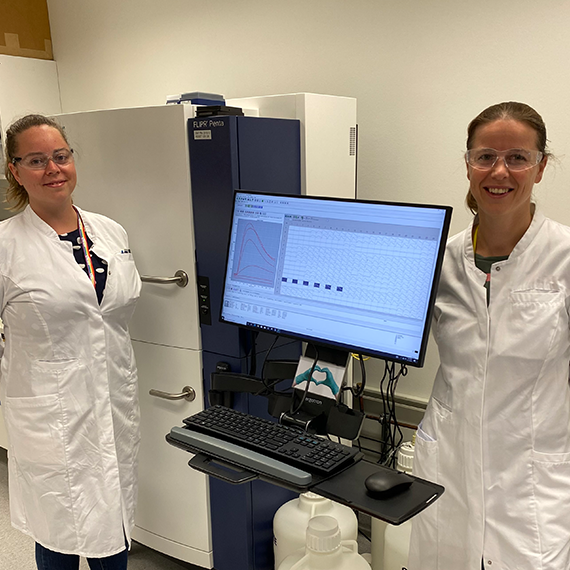Orion Corporation uses the FLIPR Penta to develop new pain medications

COMPANY/UNIVERSITY
Orion Corporation, Finland
TEAM MEMBERS
Fanny Örn, M.Sc.;
Marja Rantanen M.Sc.,
among other members of the Pain team
PRODUCTS USED
FLIPR Penta High-Throughput Cellular Screening System
ScreenWorks Software
384-well head for FLIPR Penta
The Challenge
Fanny Örn and the Pain team at Orion Corporation are dedicated to advancing pain research. Their primary focus is developing new pain medications to address the unmet need for effective non-opioid analgesic treatments, with the ultimate goal of providing better relief options for patients while minimizing associated risks.
The team, already equipped with the FlexStation® 3 Multi-Mode Microplate Reader, needed to assess the inhibitory or activating effects of their molecules on cellular responses such as Ca2+ or Membrane potential. They needed to adapt and required a versatile instrument capable of pipetting reagents and simultaneously measuring fluorescence in both 96- and 384-well plate formats for the GPCR and ion channels assays.
The team recognized the demand for increased throughput and invested in the FLIPR Tetra, a cellular screening system capable of measuring all wells in a 384-well plate simultaneously. This addition significantly slashed the measurement time for a 384-well plate to just 3 to 5 minutes. The team chose to switch to FLIPR Penta in 2022 after nearly 20 years of using FLIPR Tetra in order to take advantage of the new high-speed EMCCD camera capabilities.

The Solution
The FLIPR Penta plays a crucial role in the team's daily operations across a range of applications It has been extensively used for routine screenings to assess the inhibitory effects of potential compounds, conduct dose-response measurements, and facilitate both assay setup and target validation assays.
Orion Corporation does not generally perform what is commonly thought of as high-throughput screening, however, a high-throughput is still important for conducting routine screenings, assay setup, and optimization regularly. On average, they measure about 1-5 plates daily, translating to approximately 70 IC50* values measured daily. However, for library screenings they may measure up to 12 plates per day, equating to an impressive number of over 2000 compounds assessed daily. The FLIPR Penta's high-throughput capability allows the team to conduct assays at a much faster pace, ultimately enabling them to identify promising compounds more quickly.
Products Used
FLIPR Penta High-Throughput Cellular Screening System and ScreenWorks Software
The Results
The team's research on pain management is continuously progressing, with dedicated efforts to explore novel options. Here are some noteworthy data examples obtained by the team using the FLIPR Penta instrument.
A)

A dose response plate from a routine screening measurement containing dilution series of 14 compounds, a positive control, a negative control, as well as a reference compound dilution series.
B)

A dose response curve of ATP.
References
Inhibiting TRPA1 ion channel reduces loss of cutaneous nerve fiber function in diabetic animals: sustained activation of the TRPA1 channel contributes to the pathogenesis of peripheral diabetic neuropathy - PubMed (nih.gov)
Spinal transient receptor potential ankyrin 1 channel induces mechanical hypersensitivity, increases cutaneous blood flow, and mediates the pronociceptive action of dynorphin A - PubMed (nih.gov)

